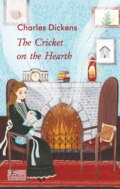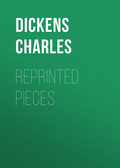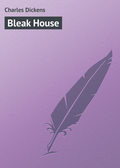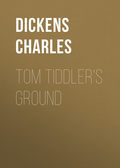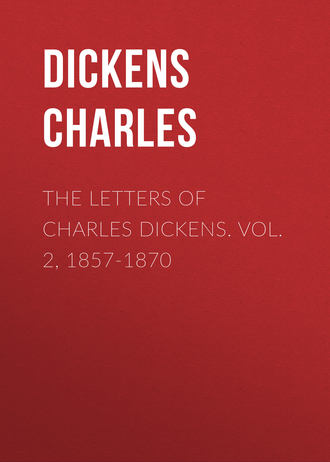
Чарльз Диккенс
The Letters of Charles Dickens. Vol. 2, 1857-1870
The only other news here you know as well as I; to wit, that the country is going to be ruined, and that the Church is going to be ruined, and that both have become so used to being ruined, that they will go on perfectly well.
* * * * * *
Miss Dickens
Office of "All the Year Round," No. 26, Wellington Street,Strand, London, W.C.,Saturday, Sept. 26th, 1868.
My dearest Mamie,
I will add a line to this at the Athenæum, after seeing Plorn off, to tell you how he went away.
Athenæum, Quarter to Six.
I can honestly report that he went away, poor dear fellow, as well as could possibly be expected. He was pale, and had been crying, and (Harry said) had broken down in the railway carriage after leaving Higham station; but only for a short time.
Just before the train started he cried a good deal, but not painfully. (Tell dear Georgy that I bought him his cigars.) These are hard, hard things, but they might have to be done without means or influence, and then they would be far harder. God bless him!
PARLIAMENT. REPLY TO A PROPOSAL MADE THROUGH ALEXANDER RUSSEL, OF "THE SCOTSMAN," THAT HE SHOULD ALLOW HIMSELF TO BE PUT FORWARD AS A CANDIDATE FOR THE REPRESENTATION OF EDINBURGH.
Mr. F. D. Finlay
Gad's Hill Place, Higham by Rochester, Kent,Sunday, Oct. 4th, 1868.
My dear Finlay,
I am much obliged to you in all friendship and sincerity for your letter. I have a great respect for your father-in-law and his paper, and I am much attached to the Edinburgh people. You may suppose, therefore, that if my mind were not fully made up on the parliamentary question, I should waver now.
But my conviction that I am more useful and more happy as I am than I could ever be in Parliament is not to be shaken. I considered it some weeks ago, when I had a stirring proposal from the Birmingham people, and I then set it up on a rock for ever and a day.
Do tell Mr. Russel that I truly feel this mark of confidence, and that I hope to acknowledge it in person in Edinburgh before Christmas. There is no man in Scotland from whom I should consider his suggestion a greater honour.
Ever yours.
M. Charles Fechter
* * * * * *
Poor Plorn is gone to Australia. It was a hard parting at the last. He seemed to me to become once more my youngest and favourite little child as the day drew near, and I did not think I could have been so shaken. You were his idol to the hour of his departure, and he asked me to tell you how much he wanted to bid you good-bye.
Kindest love from all.
Ever heartily.
The same
Office of "All the Year Round,"Wednesday, Oct. 7th, 1868.
My dear Fechter,
I got your letter sent to Gad's Hill this morning. Until I received it, I supposed the piece to have been put into English from your French by young Ben. If I understand that the English is yours, then I say that it is extraordinarily good, written by one in another country.
I do not read again in London until the 20th; and then "Copperfield." But by that time you will be at work yourself.
Let us dine at six to-day, in order that we may not have to hurry for the comic dog.
Ever faithfully.
Miss Hogarth
Queen's Hotel, Manchester, Sunday, Oct. 11th, 1868.
My dearest Georgy,
We had a fine audience last night in the Free Trade Hall, though not what we consider a large money-house. The let in Liverpool is extremely good, and we are going over there at half-past one. We got down here pleasantly enough and in good time; so all has gone well you see.
Titiens, Santley, and an opera company of that class are at the theatre here. They have been doing very poorly in Manchester.
There is the whole of my scanty news. I was in wonderful voice last night, but croak a little this morning, after so much speaking in so very large a place. Otherwise I am all right. I find myself constantly thinking of Plorn.
Miss Dickens
Adelphi Hotel, Liverpool, Monday, Oct. 12th, 1868.
My dearest Mamie,
Our lets here are excellent, and we shall have a great house to-night. We had a very fine and enthusiastic audience in the Free Trade Hall, at Manchester, on Saturday; but our first nights there never count up in money, as the rest do. Yesterday, "Charlotte," Sainton, and Piatti stayed with us here; and they went on to Hull this morning. It was pleasant to be alone again, though they were all very agreeable.
The exertion of going on for two hours in that immense place at Manchester being very great, I was hoarse all day yesterday, though I was not much distressed on Saturday night. I am becoming melodious again (at three in the afternoon) rapidly, and count on being quite restored by a basin of turtle at dinner.
I am glad to hear about Armatage, and hope that a service begun in a personal attachment to Plorn may go on well. I shall never be over-confident in such matters, I think, any more.
The day is delicious here. We have had a blow on the Mersey this morning, and exulted over the American steamers. With kind regard to Sir William and Lady Humphery.
Miss Hogarth
Adelphi Hotel, Liverpool, Tuesday, Oct. 13th, 1868.
As I sent a line to Mary yesterday, I enclose you Alfred's letter. Please send it on to her when you next write to Penton.
I have just now written to Mrs. Forster, asking her to explain to Miss Forster how she could have an easy-chair or a sofa behind my side screen on Tuesday, without occasioning the smallest inconvenience to anybody. Also, how she would have a door close at hand, leading at once to cool passages and a quiet room, etc. etc. etc. It is a sad story.
We had a fine house here last night, and a large turn-away. "Marigold" and "Trial" went immensely. I doubt if "Marigold" were ever more enthusiastically received. "Copperfield" and "Bob" to-night, and a large let. This notwithstanding election meetings and all sorts of things.
My favourite room brought my voice round last night, and I am in considerable force.
Dolby sends kindest regard, and the message: "Everton toffee shall not be forgotten."
Mr. Henry Fielding Dickens
Adelphi Hotel, Liverpool, Thursday, Oct. 15th, 1868.
My dear Harry,
I have your letter here this morning. I enclose you another cheque for twenty-five pounds, and I write to London by this post, ordering three dozen sherry, two dozen port, and three dozen light claret, to be sent down to you.
Now, observe attentively. We must have no shadow of debt. Square up everything whatsoever that it has been necessary to buy. Let not a farthing be outstanding on any account, when we begin together with your allowance. Be particular in the minutest detail.
I wish to have no secret from you in the relations we are to establish together, and I therefore send you Joe Chitty's letter bodily. Reading it, you will know exactly what I know, and will understand that I treat you with perfect confidence. It appears to me that an allowance of two hundred and fifty pounds a year will be handsome for all your wants, if I send you your wines. I mean this to include your tailor's bills as well as every other expense; and I strongly recommend you to buy nothing in Cambridge, and to take credit for nothing but the clothes with which your tailor provides you. As soon as you have got your furniture accounts in, let us wipe all those preliminary expenses clean out, and I will then send you your first quarter. We will count in it October, November, and December; and your second quarter will begin with the New Year. If you dislike, at first, taking charge of so large a sum as sixty-two pounds ten shillings, you can have your money from me half-quarterly.
You know how hard I work for what I get, and I think you know that I never had money help from any human creature after I was a child. You know that you are one of many heavy charges on me, and that I trust to your so exercising your abilities and improving the advantages of your past expensive education, as soon to diminish this charge. I say no more on that head.
Whatever you do, above all other things keep out of debt and confide in me. If you ever find yourself on the verge of any perplexity or difficulty, come to me. You will never find me hard with you while you are manly and truthful.
As your brothers have gone away one by one, I have written to each of them what I am now going to write to you. You know that you have never been hampered with religious forms of restraint, and that with mere unmeaning forms I have no sympathy. But I most strongly and affectionately impress upon you the priceless value of the New Testament, and the study of that book as the one unfailing guide in life. Deeply respecting it, and bowing down before the character of our Saviour, as separated from the vain constructions and inventions of men, you cannot go very wrong, and will always preserve at heart a true spirit of veneration and humility. Similarly I impress upon you the habit of saying a Christian prayer every night and morning. These things have stood by me all through my life, and remember that I tried to render the New Testament intelligible to you and lovable by you when you were a mere baby.
And so God bless you.
Ever your affectionate Father.
Mr. William Charles Kent
Office of "All the Year Round,"Monday, Nov. 16th, 1868.
My dear Kent,
I was on the eve of writing to you.
We thought of keeping the trial private; but Oxenford has suggested to Chappell that he would like to take the opportunity of to-morrow night's reading, of saying something about "Oliver" in Wednesday's paper. Chappell has told Levy of this, and also Mr. Tompkin, of The Post, who was there. Consequently, on Wednesday evening your charming article can come out to the best advantage.
You have no idea of the difficulty of getting in the end of Sikes. As to the man with the invaluable composition! my dear fellow, believe me, no audience on earth could be held for ten minutes after the girl's death. Give them time, and they would be revengeful for having had such a strain put upon them. Trust me to be right. I stand there, and I know.
Concerning Harry, I like to guide the boys to a distinct choice, rather than to press it on them. That will be my course as to the Middle Temple, of which I think as you do.
With cordial thanks for every word in your letter,
Affectionately yours always.
Mrs. F. Lehmann
Kennedy's Hotel, Edinburgh, Sunday, Dec. 6th, 1868.
My dear Mrs. Lehmann,
I hope you will see Nancy with the light of a great audience upon her some time between this and May; always supposing that she should not prove too weird and woeful for the general public.
You know the aspect of this city on a Sunday, and how gay and bright it is. The merry music of the blithe bells, the waving flags, the prettily-decorated houses with their draperies of various colours, and the radiant countenances at the windows and in the streets, how charming they are! The usual preparations are making for the band in the open air, in the afternoon; and the usual pretty children (selected for that purpose) are at this moment hanging garlands round the Scott monument, preparatory to the innocent Sunday dance round that edifice, with which the diversions invariably close. It is pleasant to think that these customs were themselves of the early Christians, those early birds who didn't catch the worm – and nothing else – and choke their young with it.
Faithfully yours always.
Miss Hogarth
Kennedy's Hotel, Edinburgh, Sunday, Dec. 6th, 1868.
We got down here to our time to the moment; and, considering the length of the journey, very easily. I made a calculation on the road, that the railway travelling over such a distance involves something more than thirty thousand shocks to the nerves. Dolby didn't like it at all.
The signals for a gale were up at Berwick, and along the road between there and here. It came on just as we arrived, and blew tremendously hard all night. The wind is still very high, though the sky is bright and the sun shining. We couldn't sleep for the noise.
We are very comfortably quartered. I fancy that the "business" will be on the whole better here than in Glasgow, where trade is said to be very bad. But I think I shall be pretty correct in both places as to the run being on the final readings.
We are going up Arthur's Seat presently, which will be a pull for our fat friend.
Scott, in a new Mephistopheles hat, baffles imagination and description.
Mr. W. Wilkie Collins
Kennedy's Hotel, Edinburgh, Tuesday, Dec. 8th, 1868.
My dear Wilkie,
I am hard at it here as usual, though with an audience so finely perceptive that the labour is much diminished. I have got together in a very short space the conclusion of "Oliver Twist" that you suggested, and am trying it daily with the object of rising from that blank state of horror into a fierce and passionate rush for the end. As yet I cannot make a certain effect of it; but when I shall have gone over it as many score of times as over the rest of that reading, perhaps I may strike one out.
I shall be very glad to hear when you have done your play, and I am glad to hear that you like the steamer. I agree with you about the reading perfectly. In No. 3 you will see an exact account of some places I visited at Ratcliffe. There are two little instances in it of something comic rising up in the midst of the direst misery, that struck me very humorously at the time.
As I have determined not to do the "Oliver Murder" until after the 5th of January, when I shall ascertain its effect on a great audience, it is curious to notice how the shadow of its coming affects the Scotch mind. There was such a disposition to hold back for it here (until I return to finish in February) that we had next to no "let" when we arrived. It all came with a rush yesterday. They gave me a most magnificent welcome back from America last night.
I am perpetually counting the weeks before me to be "read" through, and am perpetually longing for the end of them; and yet I sometimes wonder whether I shall miss something when they are over.
It is a very, very bad day here, very dark and very wet. Dolby is over at Glasgow, and I am sitting at a side window looking up the length of Prince's Street, watching the mist change over the Castle and murdering Nancy by turns.
Ever affectionately.
P.S. – I have read the whole of Fitzgerald's "Zero," and the idea is exceedingly well wrought out.
Miss Hogarth
Kennedy's Hotel, Edinburgh, Saturday, Dec. 12th, 1868.
I send another Scotsman by this post, because it is really a good newspaper, well written, and well managed. We had an immense house here last night, and a very large turn-away.
We have four guests to dinner to-day: Peter Fraser, Ballantyne, John Blackwood, and Mr. Russel. Immense preparations are making in the establishment, "on account," Mr. Kennedy says, "of a' four yon chiels being chiels wha' ken a guid dinner." I enquired after poor Doctor Burt, not having the least idea that he was dead.
My voice holds out splendidly so far, and I have had no return of the American. But I sleep very indifferently indeed.
It blew appallingly here the night before last, but the wind has since shifted northward, and it is now bright and cold. The Star of Hope, that picked up those shipwrecked people in the boat, came into Leith yesterday, and was received with tremendous cheers. Her captain must be a good man and a noble fellow.
The same
Kennedy's Hotel, Edinburgh, Monday, Dec. 14th, 1868.
The dinner-party of Saturday last was an immense success. Russel swore on the occasion that he would go over to Belfast expressly to dine with me at the Finlays'. Ballantyne informed me that he was going to send you some Scotch remembrance (I don't know what) at Christmas!
The Edinburgh houses are very fine. The Glasgow room is a big wandering place, with five prices in it, which makes it the more aggravating, as the people get into knots which they can't break, as if they were afraid of one another.
Forgery of my name is becoming popular. You sent me, this morning, a letter from Russell Sturgis, answering a supposed letter of mine (presented by "Miss Jefferies"), and assuring me of his readiness to give not only the ten pounds I asked for, but any contribution I wanted, towards sending that lady and her family back to Boston.
I wish you would take an opportunity of forewarning Lady Tennent that the first night's reading she will attend is an experiment quite out of the way, and that she may find it rather horrible.
The keeper of the Edinburgh Hall, a fine old soldier, presented me, on Friday night, with the finest red camellia for my button-hole that ever was seen. Nobody can imagine how he came by it, as the florists had had a considerable demand for that colour from ladies in the stalls, and could get no such thing.
The day is dark, wet, and windy. The weather is likely to be vile indeed at Glasgow, where it always rains, and where the sun is never seen through the smoke. We go over there to-morrow at ten.
Miss Dickens
Carrick's Royal Hotel, Glasgow,Tuesday, Dec. 15th, 1868.
It occurs to me that my table at St. James's Hall might be appropriately ornamented with a little holly next Tuesday. If the two front legs were entwined with it, for instance, and a border of it ran round the top of the fringe in front, with a little sprig by way of bouquet at each corner, it would present a seasonable appearance.
If you will think of this, and will have the materials ready in a little basket, I will call for you at the office at half-past twelve on Tuesday, and take you up to the hall, where the table will be ready for you.
No news, except that we had a great crush and a wonderful audience in Edinburgh last night.
Miss Hogarth
Carrick's Royal Hotel, Glasgow,Wednesday, Dec. 16th, 1868.
This is to report all well, except that I have wretched nights. The weather is diabolical here, and times are very bad. I cut "Copperfield" with a bold dexterity that amazed myself and utterly confounded George at the wing; knocking off that and "Bob" by ten minutes to ten.
I don't know anything about the Liverpool banquet, except from The Times. As I don't finish there in February (as they seem to have supposed), but in April, it may, perhaps, stand over or blow over altogether. Such a thing would be a serious addition to the work, and yet refusal on my part would be too ungracious.
The density and darkness of this atmosphere are fearful. I shall be heartily glad to start for Edinburgh again on Friday morning.
The same
Kennedy's Hotel, Edinburgh, Friday, Dec. 18th, 1868.
I am heartily glad to get back here this afternoon. The day is bright and cheerful, and the relief from Glasgow inexpressible. The affectionate regard of the people exceeds all bounds, and is shown in every way. The manager of the railway being at the reading the other night, wrote to me next morning, saying that a large saloon should be prepared for my journey up, if I would let him know when I purposed making the journey. On my accepting the offer he wrote again, saying that he had inspected "our Northern saloons," and not finding them so convenient for sleeping in as the best English, had sent up to King's Cross for the best of the latter; which I would please consider my own carriage as long as I wanted it. The audiences do everything but embrace me, and take as much pains with the readings as I do.
I find your Christmas present (just arrived) to be a haggis and shortbread!
Mr. J. C. Parkinson
Gad's Hill Place, Higham by Rochester, Kent,Christmas Day, 1868.
My dear Parkinson,
When your letter was delivered at "All the Year Round" Office yesterday, I was attending a funeral. It comes to hand here consequently to-day.
I am diffident of addressing Mr. Gladstone on the subject of your desire to be appointed to the vacant Commissionership of Inland Revenue, because, although my respect for him and confidence in him are second to those of no man in England (a bold word at this time, but a truthful one), my personal acquaintance with him is very slight. But you may make, through any of your friends, any use you please of this letter, towards the end of bringing its contents under Mr. Gladstone's notice.
In expressing my conviction that you deserve the place, and are in every way qualified for it, I found my testimony upon as accurate a knowledge of your character and abilities as anyone can possibly have acquired. In my editorship both of "Household Words" and "All the Year Round," you know very well that I have invariably offered you those subjects of political and social interest to write upon, in which integrity, exactness, a remarkable power of generalising evidence and balancing facts, and a special clearness in stating the case, were indispensable on the part of the writer. My confidence in your powers has never been misplaced, and through all our literary intercourse you have never been hasty or wrong. Whatever trust you have undertaken has been so completely discharged, that it has become my habit to read your proofs rather for my own edification than (as in other cases) for the detection of some slip here or there, or the more pithy presentation of the subject.
That your literary work has never interfered with the discharge of your official duties, I may assume to be at least as well known to your colleagues as it is to me. It is idle to say that if the post were in my gift you should have it, because you have had, for some years, most of the posts of high trust that have been at my disposal. An excellent public servant in your literary sphere of action, I should be heartily glad if you could have this new opportunity of distinguishing yourself in the same character. And this is at least unselfish in me, for I suppose I should then lose you?
Always faithfully yours.
Mr. Edward Bulwer Lytton Dickens
LETTER TO HIS YOUNGEST SON ON HIS DEPARTURE FOR AUSTRALIA IN 1868.27
My dearest Plorn,
I write this note to-day because your going away is much upon my mind, and because I want you to have a few parting words from me to think of now and then at quiet times. I need not tell you that I love you dearly, and am very, very sorry in my heart to part with you. But this life is half made up of partings, and these pains must be borne. It is my comfort and my sincere conviction that you are going to try the life for which you are best fitted. I think its freedom and wildness more suited to you than any experiment in a study or office would ever have been; and without that training, you could have followed no other suitable occupation.
What you have already wanted until now has been a set, steady, constant purpose. I therefore exhort you to persevere in a thorough determination to do whatever you have to do as well as you can do it. I was not so old as you are now when I first had to win my food, and do this out of this determination, and I have never slackened in it since.
Never take a mean advantage of anyone in any transaction, and never be hard upon people who are in your power. Try to do to others, as you would have them do to you, and do not be discouraged if they fail sometimes. It is much better for you that they should fail in obeying the greatest rule laid down by our Saviour, than that you should.
I put a New Testament among your books, for the very same reasons, and with the very same hopes that made me write an easy account of it for you, when you were a little child; because it is the best book that ever was or will be known in the world, and because it teaches you the best lessons by which any human creature who tries to be truthful and faithful to duty can possibly be guided. As your brothers have gone away, one by one, I have written to each such words as I am now writing to you, and have entreated them all to guide themselves by this book, putting aside the interpretations and inventions of men.
You will remember that you have never at home been wearied about religious observances or mere formalities. I have always been anxious not to weary my children with such things before they are old enough to form opinions respecting them. You will therefore understand the better that I now most solemnly impress upon you the truth and beauty of the Christian religion, as it came from Christ Himself, and the impossibility of your going far wrong if you humbly but heartily respect it.
Only one thing more on this head. The more we are in earnest as to feeling it, the less we are disposed to hold forth about it. Never abandon the wholesome practice of saying your own private prayers, night and morning. I have never abandoned it myself, and I know the comfort of it.
I hope you will always be able to say in after life, that you had a kind father. You cannot show your affection for him so well, or make him so happy, as by doing your duty.
Your affectionate Father.



